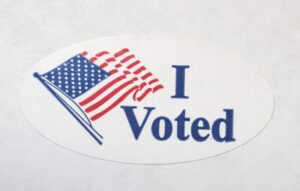It looks like the Sept. 14 preliminary election in Boston’s mayoral race will be a battle for second place.
A pair of polls, one from MassINC Polling Group and the Policy for Progress liberal think-tank and the other from Suffolk University and the Boston Globe, show at-large City Councilor Michelle Wu has a commanding lead over her rivals.
The latter poll, which surveyed 500 likely Boston voters, gave Wu support of 31 percent of likely voters and acting Mayor Kim Janey, at-large City Councilor Annissa Essaibi George and District 4 City Councilor Andrea Campbell in a statistical dead heat with between 18 and 20 percent support. Former city economic development head John Barros has support of 3 percent. Eight percent of voters in the poll said they were undecided. The poll was conducted from Sept. 2 to Sept. 4 with a margin of error of plus or minus 4.4 percentage points.
The Globe/Suffolk poll showed Janey has slipped in popularity by a small amount since the pair’s last poll in June, when Wu and Janey were statistically tied at 23.4 percent and 21.6 percent, respectively. Campbell, by contrast, has increased her share of support from only 10.8 percent in the June poll, potentially reflecting her aggressive campaigning and her vocal criticisms of the acting mayor, the other Black woman in the race.
The MassINC poll of 453 Boston residents who voted in 2020 gave Wu 30 percent support, Janey 15 percent, Essaibi George 13 percent, Campbell 11 percent and Barros 4 percent. Nineteen percent said they were undecided. The poll was conducted between Aug. 25 and Aug. 30.
How will the candidates for Boston mayor boost housing production? Read their columns in Banker & Tradesman here.
Presenting the results during a Zoom event with Policy for Progress on Friday, MassINC Polling Group President Steve Koczela said Janey and Essaibi George stand to lose or gain the most based on who turns out for the Sept. 14 election that will winnow the field to two candidates.
“What we often joke about on Twitter, that it all comes down to turnout, is actually true here,” Koczela said. “It actually does depend [on] not just how many voters turnout, but also who specifically turns out.”
Among voters who recently cast ballots in municipal elections, Essaibi George rises to second, with 16 percent, and Janey drops to third with 12 percent, slightly ahead of Campbell’s 11 percent, according to the presentation.
Kozcela said the candidates also draw their support from different demographic groups — for instance, Janey had the most support among Black voters of any candidate (23 percent), while white voters favored Wu (31 percent) and then Essaibi George (19 percent).
The poll also found 23 percent of registered Boston voters feel the housing market is the most pressing topic for the state’s capital. That ranked second-highest among more than a dozen answers tracked by MassINC, lagging only the COVID-19 pandemic, which 25 percent of voters described as the biggest issue.
No other issue cracked double digits in the open-ended question. Public education and crime and public safety tied for the third-ranked place, each earning 5 percent of voters listing it as Boston’s biggest concern.
About 72 percent of voters support making it “easier and less expensive for builders to construct more affordable housing in the city,” 62 percent support “building more housing in your neighborhood of the city,” and 56 percent support making it “easier and less expensive for builders to construct more housing in the city,” the poll found.
“We often hear a narrative of, ‘We don’t want this in our neighborhood, we don’t want this on my block,’ etc. That’s clearly untrue,” said Josh Zakim, a former Boston City Council member who is now executive director of the Housing Forward-MA group.
Staff writer James Sanna contributed to this report.




 |
| 


